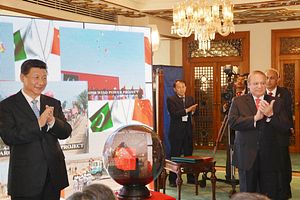With the dismissal of Prime Minister Nawaz Sharif on July 28 by Pakistan’s Supreme Court, eyebrows were raised about the future of the $62 billion China-Pakistan Economic Corridor (CPEC). Some media outlets ran stories questioning whether the government of Pakistan would adhere to the project without Sharif at the helm.
The fact remains that the multi-billion dollar enterprise will continue to be followed by the government despite the leadership change; the crucial project is between Pakistan and China, a relationship that is well known for its stability. Plus, if the project were to be discontinued for whatever reason, Pakistan would not be able to clean up the resulting mess and economic anarchy.
If any force inside China or Pakistan, civilian or military, attempted to scrap CPEC, the consequences would be horrible for both sides. Pakistan would no longer have a viable economic plan without CPEC, while for China, without CPEC the entire gambit on its Belt and Road — including building other five economic corridors linking East Asia to Europe — could be wiped out, as CPEC is the flagship of all those related projects.
It must be understood that the CPEC is not a dogmatic project. It is a purely economic and commercial initiative of high importance that guarantees Pakistan’s future economic outlook. The project has become a existential part of the country’s future and now it is as important as the ideology of Pakistan and its nuclear program.
In Pakistan, there is a comprehensive and wide-ranging national consensus over CPEC. There is no power struggle over CPEC as far as the ever troubled civil-military relations are concerned in Pakistan; CPEC is above that perpetual rift. The Armed Forces of Pakistan are also backing the project by providing for its safe execution as self-appointed custodians. Besides the political understanding on CPEC between China and Pakistan’s governments, the militaries from both sides are deeply involved in the safety and early completion of CPEC projects.
Speaking on the occasion of the 9oth anniversary of the People’s Liberation Army (PLA) on July 31 in Islamabad, Chinese Military, Naval, and Air Attaché Major General Chen Wenrong said, “Pakistan and China are closely working to execute the CPEC project. We are building win-win cooperation and a community of the shared destiny.”
Chief of Army Staff (COAS) General Qamar Javed Bajwa also attended the PLA anniversary celebrations, He said that “today, this close collaboration [between China and Pakistan] spans over a wider canvas than ever before and ranges across strategic initiatives like the China-Pakistan Economic Corridor, defense collaboration in numerous joint projects, and [a] united diplomatic front internationally.” Pakistan cannot afford to miss out on CPEC at any cost, especially given that a setback on the project would jeopardize the country’s strategic ties with China.
For its part, China has no reservations about the continuity of the CPEC after the Supreme Court verdict against Prime Minister Nawaz Sharif. China will continue to work with Pakistan on CPEC projects without any disruption. This was assured by a spokesperson from the Chinese Ministry of Foreign Affairs, Lu Kang, while commenting on Sharif’s ouster.
Lu said that “we believe that the China-Pakistan strategic cooperative partnership will not be affected by the change of the situation inside Pakistan. China stands ready to work with Pakistan to continue jointly building the One Belt and One Road.” The all-weather friendship between China and Pakistan has withstood the test of time, he added.
A high-level delegation of Pakistan’s interim government will pay a visit to Beijing in August, where it will demonstrate to the Chinese side its continued and firm commitment toward CPEC. The interim government will also inaugurate many major CPEC power projects next month, including the Balloki power project, Dasu hydropower project, Port Qasim LNG project, and Chashma-IV nuclear power plant. Assurances from both sides have reinforced their commitment to CPEC without any shift on its basic policy framework and ongoing projects.
Over the past four years, the incumbent government of the Pakistan Muslim League-Nawaz (PML-N) developed a plan relying on CPEC to address the fundamental woes of Pakistan’s economy by building a strong network of connectivity within and outside the region. The policy was used as leverage in Pakistan’s relationships with neighboring countries, including Central Asia, Russia, and beyond. The revival of Pakistan’s economy is just based upon this policy as well. The change of leadership within the ruling PML-N will not alter or even make a tiny shift in its policy toward CPEC. If all goes as planned, Pakistan would achieve its primary interests to transform itself into an “Asian Tiger.” Pakistan is on the main drag of success and it looks that no one can break the durability of this unshakable joint venture.
Dr. Ahmad Rashid Malik is Director of the China-Pakistan Study Center at the Institute of Strategic Studies Islamabad. He writes on East Asian affairs.

































